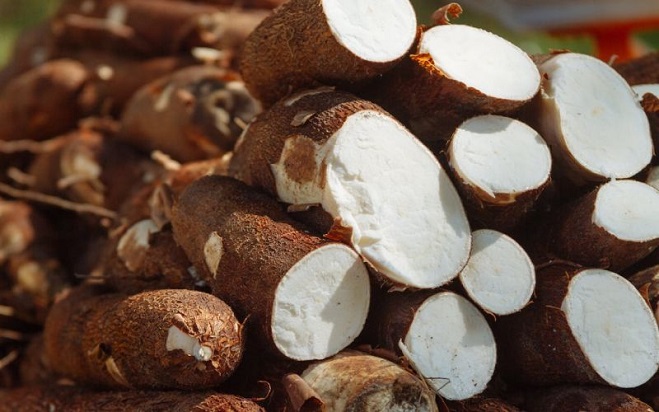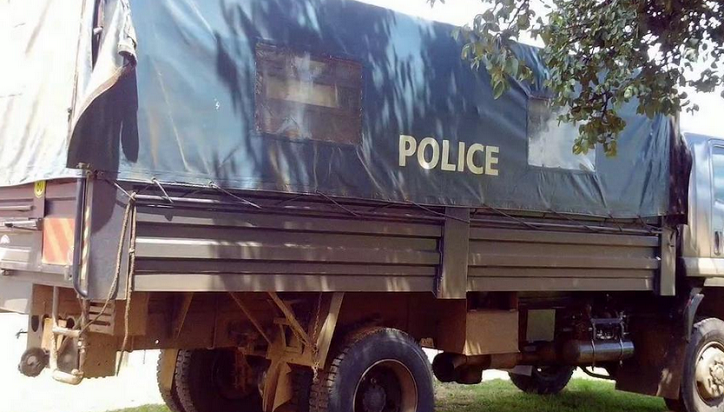South Sudan Refugees in Pagirinya Refugee settlement, Adjumani District are reaping big from cassava farming.
Last year, a group of refugees at the settlement interested in farming were tipped of an intervention to conduct communal farming with the host community in Dzaipi Sub-county.
The initiative was rolled out by Action Against Hunger (ACF), a non-governmental organization through funding from Netherlands Government (Right2Grwo project) and European Union Trust Fund (RISE Project).
According to the initiative, the refugees search for land from the host community to embark on a large-scale commercial cassava growing project. In July, the host community members of Pagirinya village generously donated 68 acres of land to the group which comprised 99 members, the majority of whom are South Sudan refugees.
This initiative has seen the refugees plant cassava and has started harvesting their cassava both for sale and home consumption.
One of the refugees Alex Lou fled his country in July 2016, days after a rift between loyalists of President Salva Kiir and his deputy Riek Machar sparked off civil unrest. When he arrived at Pagirinya Refugee settlement a month later, life here was far from what he was used to back home.
He had to adjust to living on 30 by 30 meters of land offered by the government and depending on monthly food and cash ration donated World Food Programme.
The 54-year-old father of eight children was however lucky to have received some training in kitchen gardening, a year later to utilize his small land to grow vegetables for supplementing the family’s diet. But that wasn’t going to be enough to help out the large family.
He says that his woes further grew in 2020, at the time the world was gripped by the Coronavirus (Covid-19) pandemic when the World Food Programme (WFP) cut down food and cash ration by 40 percent owing to a funding shortfall. Lou like many other refugees in the settlement who depended on assistance had to expand their sources of livelihood through farming.
From receiving 31,000 shillings per month cash ration, Lou and his family started getting a paltry 19,000 shillings.
Lou was however tasked to search for land from the host community to embark on a large-scale commercial cassava growing project. In July, last year, host community members of Pagirinya village generously donated the land to the group which comprised 99 members, the majority of whom are South Sudan refugees.
On the donated land, the refugees later planted cassava. From their harvest, the group made cash sales of 126 million shillings out of which each member got 1.5 million shillings. To Lou, this was the highest amount of money he handled in just a month ever since he became a refugee in Uganda.
Lou says the money has helped him to pay school fees for his four children who are in Senior one, Primary seven, Primary Six, and another one undertaking an engineering course in Arua City.
Another refugee Bako Milka 39, who fled from Nimule in 2016 says through growing cassava, outside the refugee settlement, she has become self-reliant.
The mother of five children says unlike in the past when they would eat food once a day, this time round the family eats three times a day adding that she has also shifted her children to private schools.
On Tuesday, the farmers donated 500 bags of cassava cuttings worth 30 million shillings from their gardens to farmers’ groups in Dzaipi, Ukusijoni, sub-counties in Adjumani and Yumbe districts to embark on large-scale cassava growing. The farmers were also given a tractor.
The group is now targeting to acquire more land from the host community to expand the venture and introduce more vulnerable South Sudan refugees.
Albert Siminyu, the Country Director of ACF Uganda acknowledged that land opening remains a major problem for most farmers intending to conduct large-scale farming. He says the donated tractor will be used to clear 366 acres of land this planting season adding that more than 3,000 acres will be opened next year.
Siminyu lauded the farmers for embracing communal farming saying it will go a long way in helping them address hunger and poverty.
James Viciri Logwenya, the Dzaipi Sub-County Agricultural Officer says with refugees now embracing communal farming, the majority will become self-reliant in the long run thus closing the gap between reliance on food and cash aid.
Titus Jogo, the Refugee Desk Officer at OPM in charge of Adjumani and Lamwo District says that the intervention is welcome and adds to several other measures being undertaken to promote food security in the settlements. For instance, UNHCR is currently utilizing 2,000 acres of land donated by a local in Mungula parish, Ititrikwa sub-county to grow maize for the refugees.
Food shortage remains a major setback among refugees in West Nile Region. Recently humanitarian aid agency WFP temporarily introduced rice for the refugees to supplement maize which is already scarce.
Dazaipi Sub-county alone host some 99,601 refugees mostly from South Sudan against the population of the host community which stands at 22,215.
–URN





